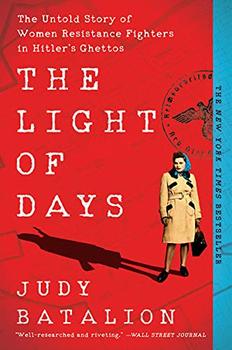Summary | Excerpt | Reviews | Beyond the book | Read-Alikes | Genres & Themes | Author Bio

The Untold Story of Women Resistance Fighters in Hitler's Ghettos
by Judy BatalionRenia, Sarah, Zivia, Frumka, Hantze, Tosia, Vladka, Chajka, Gusta, Hela, Bela, Lonka, Tema, Chasia, Chaika, Ruzka, Vitka, Zelda, Faye, and Anna.
These are the names of the women who populate Judy Batalion's nonfiction narrative, The Light of Days. It is, to be sure, a dizzying cast of characters and an equally dizzying tale. The book centers around the female freedom fighters who emerged from Nazi-occupied Poland and the tremendous, yet largely unacknowledged, acts of leadership and courage they performed.
Even with Batalion's introduction and brief description of each woman, it takes a while to truly sort everyone out. This is especially true when this multitude is operating against the backdrop of a tumultuous, large-scale war. A lot can and does get lost. The women are constantly moving, constantly hiding, and constantly obfuscating. Yet, Batalion manages this glut of information and chaos with her engaging narrative style. The book opens on a tense meeting in Bedzin in which the freedom fighters (both men and women) must decide to flee or fight. Several of the primary women appear here in short succession. And even if readers don't truly know the women yet, it's immediately apparent what is at stake. Ultimately, no one chooses to flee. They decide, as Frumka says, "If we must die, let us all die together."
More high stakes, action-packed scenes move the narrative along, but the author never loses hold of the pace, interweaving each woman's personal history. These stories within the larger story of the resistance highlight the serene and close-knit lives the women led before the war and create a stark contrast to their present situations. The list of names continues to do some grounding work here as well. The names constitute a litany of sorts, a mantra that keeps the reader rooted in the book as it progresses. We are viscerally present, witnessing, in seeming real-time with the women themselves, the utter inversion of their former lives. After the death of Renia's sister, readers learn, "She had to reorient her being, remind herself that now she lived for her sister, for her comrades. This was her new family." The women, once unknown to each other, draw closer together as their families and communities are scattered to the wind.
The list of names also creates an effective bit of symmetry for the women's resistance work. As Jews, they are constantly terrorized with names and lists. Batalion writes of the Nazis, "They came with a list of thirty names, grabbed these men, women, and children from their houses, and beat and shot them." On any given day, names and naming become a source of fear and control for the Jews. The women, however, adaptable and intuitively reactive as they are, co-opt the weaponizing of names by becoming nameless. They falsify IDs to move between the ghetto and the Aryan side of town. They give Jewish children new names in order to keep them safe in Aryan homes. They remove or obscure names of resistance fighters from all correspondence. And, for some of those who eventually make it to Israel, they choose new surnames that allow them to forge new selves separate from their traumatic European pasts.
The women use lists to their advantage as well. They order their lives and maintain their communities through lists. Even if it is by memory alone, they keep a running account of books so that Jews in the ghetto can continue to learn about and celebrate their history. They document the precise amounts of food, money and weaponry to make sure that there will be enough for everyone. And they document the children who have been orphaned or rehomed so that they can continue to care for them. Through their own lists, the women try to safeguard the group's tenuous future.
Beyond Batalion's talents for form and style lies her enormous achievement as a researcher. Any reader who has conducted research themselves will understand what it means for her to have waded through thousands of pages of archival material in different languages and in different countries. To have organized the innumerable names, dates, locations and events. To have emotionally processed the precise and abjectly horrific details of the Nazi's final solution. That she has been able to accomplish all of this without burdening the reader with that same feeling of toil is simply stunning. This book will instruct and astound you, while also bringing you to tears.
![]() This review was originally published in The BookBrowse Review in April 2021, and has been updated for the
September 2022 edition.
Click here to go to this issue.
This review was originally published in The BookBrowse Review in April 2021, and has been updated for the
September 2022 edition.
Click here to go to this issue.

If you liked The Light of Days, try these:

by Suzanne Cope
Published 2025
The gripping, true, and untold history of the Italian anti-fascist resistance during World War II, told through the stories of four spectacularly courageous women fighters.

We Must Not Think of Ourselves
by Lauren Grodstein
Published 2024
A heart-wrenching story of love and defiance set in the Warsaw Ghetto, based on the actual archives kept by those determined to have their stories survive World War II
Your guide toexceptional books
BookBrowse seeks out and recommends the best in contemporary fiction and nonfiction—books that not only engage and entertain but also deepen our understanding of ourselves and the world around us.